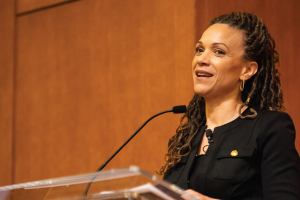Melissa Harris-Perry shares her experiences and advice in the inaugural Frank A. Daniels Jr. Lecture

By Olivia Henley ’25
Melissa Harris-Perry inspired more than 350 UNC students, faculty, staff and community members March 21, 2023, at the Frank A. Daniels Jr. Lecture by reflecting on her unique career, being blatantly transparent about her greatest triumphs and biggest mistakes.
Harris-Perry has had a dynamic career in media, notably hosting the weekend morning show, "Melissa Harris-Perry," at MSNBC. She is currently the Maya Angelou Presidential Chair at Wake Forest University. Harris-Perry discussed how to make media matter and how to survive the media world through the context of personal experiences in her various professions.
"You have to decide what your award is,” she told the filled auditorium, which included a nephew and grandson of Frank A. Daniels Jr ’53.“What is your Peabody? What is your Oscar? What is the thing you are going for?"
She told students that to survive the media world, they must decide who it is they want to be, whether it is rewarded or not.
Simply being great, she said, is not enough to be rewarded by the system.
Instead, she said, "Bringing what I love to an audience in a way that is thick and contributes, that's my Oscar."
How to make media that matters
The inaugural Frank A. Daniels Jr. Lecture at the UNC Hussman School of Journalism and Media took place at the George Watts Hill Alumni Center Tuesday, March 21. Frank A. Daniels Jr '53 was the publisher of The News & Observer for 25 years. Under Daniel's direction, the paper won the Pulitzer Prize for Public Service in 1996. Daniels is a 1996 inductee to the NC Media & Journalism Hall of Fame.
During her speech, Harris-Perry emphasized the importance of being ignorant when striving to make media that matters: "Presume that you don't know anything," she said.
She advised that in order to be producers and not just consumers of knowledge, it is important to presume ignorance—even about oneself. While personal experience is a great place to generate a hypothesis, it is a lousy place to test it because then you would simply be relaying your memoir. Start with ignorance.
Harris-Perry discussed ignorance in the context of a scientific experiment.
"Remember that your job when testing a hypothesis is to attempt to falsify your hypothesis, not to confirm it," she explained.
Harris-Perry also highlighted the power of silence.
"Silence is necessary to make meaningful media,” she said. “If you are talking, you are not listening."
In the media, she said, there is a difference between being silent and being silenced. She stressed how sometimes one’s silence will end up saving others because it will make room for other people to speak up.
Harris-Perry stressed, "What happens if you wake up and you make love to the day wordlessly? How might your voice change?"
She then urged students to "be thick”: "In a profession focused on producing thick content — do thick work."
Harris-Perry elaborated that in being thick, you are producing work that operates on many layers—work that assumes your audience is smart enough to follow you on an adventure.
She concluded her speech about making the media matter, which takes courage—and could have repercussions.
“Every time I've stood up to the bully I’ve been fired,” she said, referring at least in part to the show she hosted from 2012-2016, “Melissa Harris-Perry,” at MSNBC, which earned her a Hillman Prize for broadcast journalism.
Imperfect, fearful and never alone
Following her speech, three Hussman students, Carolyn Schmitt ’23 (MA), Leslie Guzmán ’23, and Taylin Cain ’23, engaged in a dialogue with Harris-Perry about election coverage, how to navigate editorial discussions when you hold the unpopular opinion and authenticity as a reporter.
Cain asked Harris-Perry what it should look like for a reporter to stick to their wits while continuing to pave the way. Specifically, she wanted to know how Harris-Perry reported on sensitive topics such as systemic racism while enduring backlash from others.
Harris-Perry responded by saying she has been imperfect and terrified but never alone through the journey of her career.
"If you can't be honest with yourself that things hurt, that you need tools, that not all the tools are perfectly healthy — you also won't survive this," she said.